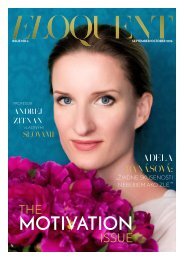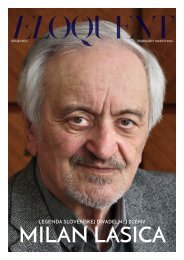ELOQUENT DECEMBER
You also want an ePaper? Increase the reach of your titles
YUMPU automatically turns print PDFs into web optimized ePapers that Google loves.
vantaged students, roughing up your background<br />
won’t help your cause. The essays<br />
serve as a glimpse into how your mind<br />
works, how you view the world and provides<br />
perspective. If you have never had some<br />
earth shattering experience that rocked<br />
your world, don’t pretend you did. Your<br />
insights will be forced and disingenuous.<br />
8. Follow the instructions.<br />
While the directions on the applications<br />
may sound generic, and even repetitive<br />
after applying to a variety of<br />
schools, but every rhyme has a reason. The<br />
colleges do know who they are looking for<br />
and what they are looking for in the applications.<br />
They think long and hard about<br />
the directions and they want to find them<br />
step for step in the student’s application.<br />
Essay that worked: How to Become an Adult- Michaela<br />
(source: apply.jhu.edu/apply/essays-that-worked/)<br />
9. Use this space to tell them what your application can’t.<br />
Most colleges don’t have the time to<br />
research each individual applicant. They<br />
only know what you put in front of them.<br />
Try to answer the question, “What else<br />
does the college need to know?” The essays<br />
should give an answer to that question.<br />
At the end of the day, however, the college<br />
admissions officers want students to<br />
know that the personal essay is just another<br />
piece of the larger puzzle. Students<br />
prescribe way too much importance to the<br />
essay. It makes a massive difference—good<br />
or bad—to very few out there, so keep it<br />
in context.<br />
- Martin Sadloň<br />
In the US, legal adulthood comes at 18, but it is my understanding that adulthood comes<br />
through responsibility, tears, laughter, and most of all: parenthood. It is effortless to watch other<br />
people’s children grow and flourish, but having my own was a terrifying new world for which I<br />
was ill-prepared. I was not ready for my first, Stanley, but now I cannot envision a world without<br />
him. Today, I am the proud parent of not one, but seven beautiful, boisterous, carnivorous plants.<br />
Within my small family I have four sundews, two Venus flytraps, and one tropical pitcher plant. Of<br />
course they have scientific names, but I only use them when I am angry and my inner-parent reveals<br />
itself. Many might ask, “How does a person become the parent of seven carnivorous plants?”<br />
and I can only answer that with a story, my story.<br />
It was an ordinary Wednesday afternoon when I came home from school only to find a<br />
charming plant that resembled a leafless, dew-splattered fern perched on the counter. With the<br />
eloquence that only a teenager could muster, I asked my mother, “What’s that?” She carefully<br />
explained that he was our new carnivorous plant and he was going to be on fruit fly kitchen duty.<br />
Over the next couple of weeks my fascination with him grew, and eventually I adopted him as<br />
one of my own. In all sincerity, I did not begin as the ideal parent. I would give Stanley water to<br />
drink if he looked drier than usual and that was the extent of my nurturing efforts. However, my<br />
complacency did not last. Come winter, around his half birthday, Stanley became afflicted with<br />
a mysterious ailment. His stems curled and his one delicate green frond dried up. After carefully<br />
examining him, I concluded that not only was the lake water I had been using contaminated with<br />
some sort of root-eating larva, but my mother’s African violets had given him aphids. It was then<br />
that I was faced with the harsh reality of the situation: I had a plant that I was absolutely obsessed<br />
with, but knew nothing about.<br />
In my desperation to keep my sundew alive, I began to contact other plant enthusiasts in<br />
an increasingly desperate attempt to help my poor Stanley. To my great surprise, a close friend<br />
was also a carnivorous plant caregiver and was well versed in childhood care. His advice, coupled<br />
with some new dirt and the stocked shelves of the nearby library’s horticulture section, allowed<br />
me to nurse Stanley back to health. Stanley regained his strength and shortly after the winter incident,<br />
I adopted Simone, another sundew. Then came Diana, my first Venus flytrap. Consequently,<br />
the carnivorous plant aficionado was so impressed with Stanley’s care that he entrusted me with<br />
the care of his carnivorous plants when he left for college. This brought my family’s size to the<br />
current seven.<br />
My true reward of having Stanley is that he opened the door to the world of botany. I<br />
would never have invested so much time learning about the molecular structure or chemical balance<br />
of plants if not for taking care of him. I have loved learning for his benefit, whether it be<br />
discovering the best fluoride-free water, finding the ideal amount of sunlight, or reading that he<br />
uses a form of electrical signaling to improve digestion. I also love the rarity of being Stanley’s<br />
parent. People have their judgments, but I have also found that most people are genuinely curious<br />
and I am always open to questions. Ultimately, I love how Stanley has forced me to be adaptive.<br />
That first winter I did not have a “Gardener’s Guide to Carnivorous Plants,” I simply had my own<br />
observations. This was the most significant lesson that Stanley and friends taught me: the universe<br />
lacks a guide to the galaxy, and life is all about discovering your own way.<br />
“Michaela showed<br />
her innate curiosity<br />
through a unique topic.<br />
The beginning of<br />
her essay is intriguing<br />
and makes you<br />
want to learn more.<br />
More importantly,<br />
she elaborates on an<br />
interesting aspect<br />
of her life outside of<br />
academics, yet still<br />
demonstrates the<br />
depth of her desire to<br />
be perpetually learning.<br />
It also gave us<br />
insight into how she<br />
responds when she<br />
is passionate about<br />
something.”<br />
—Johns Hopkins Undergraduate<br />
Admissions<br />
Committee<br />
<strong>ELOQUENT</strong> 15





